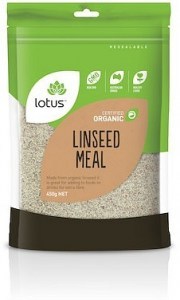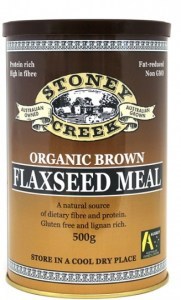
Flaxseed Meal

Flaxseed meal is made from ground flaxseed, small golden or brown coloured seeds from the (linum usitatissimum) flax plant.
Flaxseeds have been consumed for centuries, praised for their high nutrient value and versatility in cooking. Containing a generous amount of protein, fibre and omega-3 fatty acids as well as a long list of vitamins and minerals they are a powerhouse of nutrition. Ground flaxseed, or flaxseed meal, in particular is considered the most nutritious way to consume flaxseed, providing a higher efficacy thanks to the accessibility of the seed’s nutrients when crushed and ground into a meal, allowing the body to better absorb its goodness.
The health benefits of flaxseed meal are plenty and scientists agree adding ground flaxseed to a healthy diet has the potential to impact a variety of health woes. Research suggests flaxseed’s omega-3 fatty acids, lignans, and fibre are the main contributors to the seed’s potential health benefits. Here’s a look at some of the reported health benefits of flaxseed.
Benefits of Flaxseed Meal
Flaxseeds are highly nutritious:
Just one tablespoon of ground flaxseed contains around 2g fibre, 1.5g protein, 2g carbs, and an impressive amount of heart-healthy fats, vitamins and minerals including vitamins B1 & B6, folate, calcium, iron, magnesium, phosphorus, and potassium as well as several other plant compounds (ferulic acid, p-Coumaric acid, phytosterols and more).
May benefit heart health: Considered one of the best sources of alpha linolenic acid (ALA), a plant-based omega-3 fatty acid, flaxseeds are an excellent choice for vegetarians and vegans. ALA isn’t produced by the body, so we must obtain this essential fatty acid from the foods we eat. Studies have shown potential health benefits associated with a diet that includes plant-derived ALA, including a lowered risk of heart disease and stroke.
May help improve cholesterol levels: An evaluation of the effects of flaxseed on a group of individuals with high cholesterol showed a significant reduction in LDL cholesterol levels, indicating a 15% reduction overall.
As an essential fatty acid that provides the body with ‘good fats’, alpha linolenic acid (ALA) has been researched in relation to its potential benefits in improving cholesterol levels. Numerous studies have explore the potential health benefits associated with ALA and cholesterol levels, with this one showing ALA can be beneficial in preventing cholesterol from depositing in the hearts blood vessels with a significant reduction in plaque formation.
May benefit blood pressure: Flaxseed meal is packed full of good fats, with one tablespoon of flaxseed composing 73% polyunsaturated fatty acids (omega-3 &-6) and 27% monounsaturated and saturated fatty acids. Considered one of the richest sources of ALA available, this polyunsaturated fatty acid has shown a lot of potential in terms of health benefits for the entire body, including heart health, arterial function, and more.
In terms of blood pressure, a study out of Canada found daily consumption of flaxseeds has the ability to lower both systolic and diastolic blood pressure, with a marked improvement for those already on blood pressure medications.
Flaxseed may help with weight management: Dietary fibre has long been hailed a hero when it comes to suppressing appetite. Flaxseeds contain soluble fibre, which has been shown to be effective in suppressing hunger and promoting satiety. Studies have shown their potential in helping overweight people lose weight, with this one recording weight loss for participants who included flaxseeds in their diet with no change to the control group.
May benefit digestive health: Containing both soluble and insoluble fibre, flaxseed is beneficial for maintaining good digestive health. The two types of fibre work together to benefit digestion, creating bulk and softening stool to assist it to move through the gastrointestinal tract while feeding the good bacteria in the gut. Including flaxseed meal in a healthy diet can help aid digestion, promote regular bowel movements, and prevent constipation.
What can Flaxseed Meal be used for?
With all those potential health benefits you’re probably wondering how you can incorporate flaxseed meal into your diet. Thankfully, this nutritious seed is incredibly easy to use and is very versatile, whether you enjoy it as ground flaxseed, flaxseed oil, or as the seed itself.
Ground flaxseed, or flaxseed meal, is considered one of the best ways to consume flaxseeds in terms of nutrient absorption.
Thanks to its neutral flavour flaxseed goes well in both sweet and savoury dishes. Flaxseed meal can be added to baked goods, including cakes, muffins, and cookies, can be blended up in a smoothie, used in porridge, included in homemade muesli, added to soups, stews, and lots more.
Top Selling Flaxseed Meal
Nutrition
These tiny seeds are incredibly rich in nutrition. They’ve been named one of the most nutrient dense foods around thanks to their long list of nutrients. With fibre, protein, essential fatty acids, an impressive area of minerals, and B vitamins it’s no wonder they’ve been touted as a superfood for centuries.
Here’s a look at the nutrition profile of flaxseeds. One tablespoon (approx 7 grams) of ground flaxseed contains:
| Calories: | 37 |
| Protein: | 1.3 grams |
| Carbs: | 2 grams |
| Fiber: | 1.9 grams |
| Total fat: | 3 grams |
| Saturated fat: | 0.3 grams |
| Monounsaturated fat: | 0.5 grams |
| Polyunsaturated fat: | 2.0 grams |
| Omega-3 fatty acids: | 1,597 mg |
| Vitamin B1: | 8% of the RDI |
| Vitamin B6: | 2% of the RDI |
| Folate: | 2% of the RDI |
| Calcium: | 2% of the RDI |
| Iron: | 2% of the RDI |
| Magnesium: | 7% of the RDI |
| Phosphorus: | 4% of the RDI |
| Potassium: | 2% of the RD |
FAQ:
Is flaxseed meal good for you?
Flaxseed meal, as opposed to whole flaxseeds, is the more beneficial of the two in terms of nutrient availability. Flaxseed meal is essential finely ground flaxseeds so it contains all the nutrients of the seed but with more bioavailability and the ability for nutrient absorption. You can read more about the extensive list of nutrients contained in flaxseed above, but know that these tiny seeds are full of good-for-you nutrition.
What is flaxseed meal good for?
Flaxseed meal is good for so many things! In terms of health benefits it may help reduce blood pressure, cholesterol, maintain a healthy weight, promote good digestion, and more. When it comes to what it’s good for in terms of cooking, it can be used in just about anything - think smoothies, baking (flaxseeds make a fantastic egg replacement), as a thickening agent in soups and stews and lots, lots more.
What does flaxseed meal taste like?
Flaxseed meal has a fairly unremarkable taste, leaning mostly towards an earthy or nutty flavour.
Can I replace flour with flaxseed meal?
Flaxseed meal is great for baking and can be a fantastic substitute in gluten-free baking. See specific recipes for how it can be used as a flour replacement.
What does flaxseed meal replace?
Flaxseed meal is a great replacement for eggs and flour in baking and can also be used as a ‘fat’ in cooking. It’s regularly used in cakes, muffins, and cookies, and more.
Who should not eat flaxseed meal
We always recommend speaking with your doctor if you have any concerns in relation to adding to or altering your diet in any way. Anyone taking blood thinning medication, or with cholesterol issues should speak to a medical professional prior to incorporating flaxseed meal into their diet. Additionally, anyone who is pregnant or breastfeeding should speak to a medical professional

Stoney Creek Golden Flaxseed Meal 500gm
Stoney Creek Golden Flaxseed Meal is made from NASAA Certified Organic golden flaxseed previously cold pressed to extract the oil. Its pleasant nutty flavour makes it a nice, nutritious breakfast topping that’s quite rich in protein and fibre. And no, you’re not missing out on the oil’s healthy omega-3s. Cold pressing is the best extraction technique for flavour and nutrition, but it’s not the most efficient, so this flaxseed meal is still up to 10% flaxseed oil!
Ingredients: Flaxseed
Shop nowFlaxseed meal is made from flax seeds, small brown or golden seeds from the flax plant. The seeds are incredibly nutritious, providing a host of minerals, vitamins, fibre, protein, and more.
Health professionals credit the seed’s fibre, lignans, and omega-3 fatty acids for the purported health benefits associated with incorporating flaxseed meal into a health diet. Some of the most studied and credited health benefits include: lowering cholesterol, improving digestion, aiding in weight loss, lowering blood pressure, and promoting bowel health.
It’s reported ground flaxseeds are the most beneficial because the seeds themselves, if consumed unprocessed, won’t be broken down by the body and therefore much of their nutrient content will be lost.
Flaxseeds are very easy to incorporate into a healthy diet and can be used in a wide variety of recipes, from sweet to savoury. There are some risks and side effects when altering your diet and high levels of flaxseed don’t agree with everyone. Therefore we always recommend you speak to a health professional prior to making any major changes to your diet.






